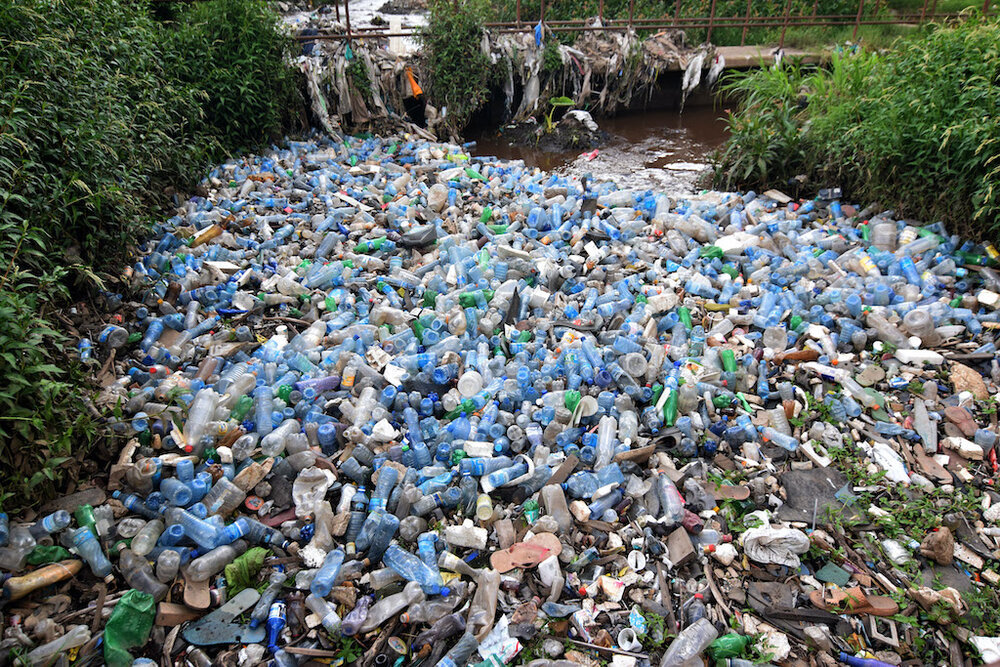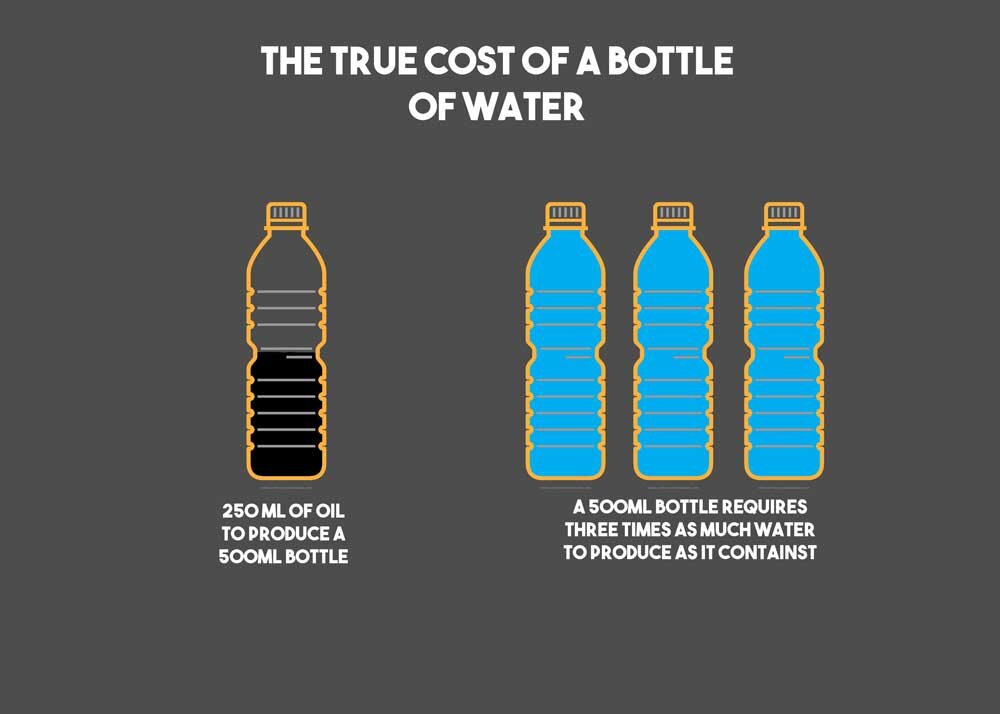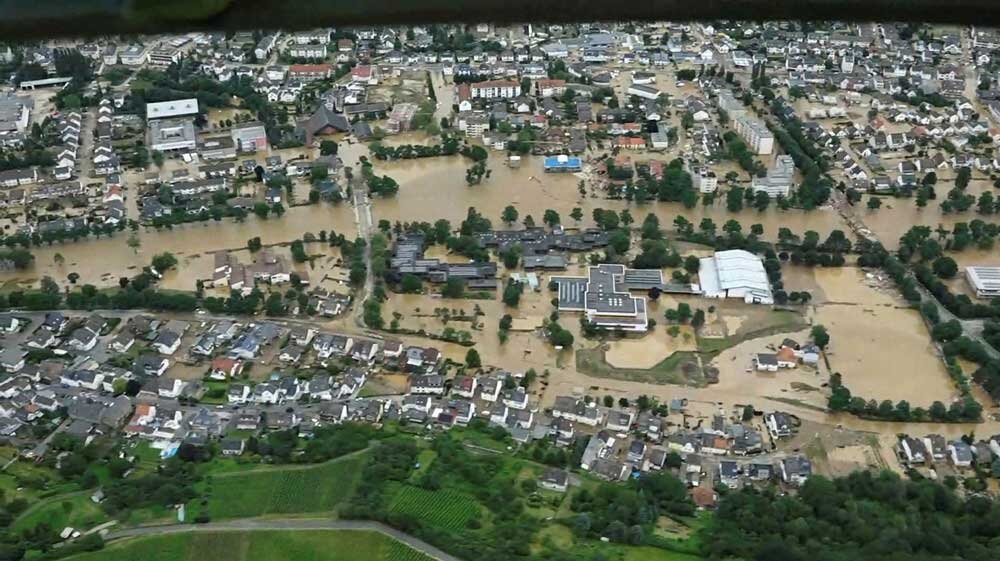
The Plastic Problem & The Climate Crisis
The growing issue of plastic waste is now as commonly recognised as the global Climate Crisis – and the two are inextricably connected.
While we often hear reports of the plastic problem in abstract, these rarely give a true sense of the scale of the issue, or how our addiction to plastic is worsening the Climate Crisis at a time when we urgently need to reduce both consumption and emissions.
Today we look at the issue of plastic pollution, and why this matters if we are to avert the worst possible outcomes of the Climate Crisis before it’s too late.
Plastic Is Oil
The first and most important thing to note is that plastic is oil.
While other ingredients may be used to make plastic, around 8-10% of the world’s total oil production is used to produce plastic items.
In fact, a standard 500ml plastic bottle requires 250ml of oil for its production.
So when we talk about going fossil fuel-free, it isn’t just about switching from an diesel, petrol or hybrid car to an electric one, it’s about understanding how we can cut out oil and other fossil fuels in every aspect of our lives.
In fact, the plastic bottle is the perfect example of how we have been sold an unsustainable lie in order to increase corporate profits. Did you know that less than 0.001% of the money you pay for a bottle of water accounts for the cost of the water itself?
But it isn’t just about the financial side. A single, humble bottle of water uses three times more water in its production than it actually contains – which is why it is hardly a surprise that mass-producing water regions like Volvic are now running dry.
Producing plastic bottles for water and fizzy drinks leaves a considerable environmental toll. Credit: IrishEVs
Then there’s the CO2 emissions produced; with a 5 ounces of CO2 produced for every single ounce of PET (polyethylene terephthalate – the most common rigid plastic in water bottles).
Recycling Isn’t Enough
While we will all endeavour to recycle as much waste as possible, the idea of recycling is an imperfect system.
It takes vast quantities of energy, and produces swathes of emissions to recycle a product – and in the meantime, raw materials are still being extracted from the Earth to meet demand.
In fact, half of all plastic ever manufactured has been made in the last 15 years – fuelled by 1 million plastic bottles being bought around the world every minute.
Vast amounts of plastic pollution ends up in the world’s waterways and oceans, as seen here in Uganda. Credit: Nirere Sadrach
If those stats alarm you, they should.
But then consider that Ireland alone has generated more than 1 million tonnes in packaging waste for at least three years in a row, with the average Irish person creating 229kg of waste packaging per year – up 11% from 2018.
Yet even if we set aside the recycling itself is imperfect compared to reusing – more on that below – we as a nation are shockingly poor at actually bothering to recycle our plastic waste.
The recycling rate of plastic waste has continued to decline over recent years, just 28% of the 320,000 tonnes of plastic packaging waste generated in Ireland in 2019 being recycled.
Meanwhile, just 16% of this packaging was actually recycled here in Ireland, with the rest being sent abroad, creating even more harmful greenhouse gas emissions in the process of transporting it.
While much of the remainder will end up in landfill or polluting roadsides, rivers and the ocean, a total of 39,000 tonnes of recyclable plastic were sent for incineration, according to EPA Senior Scientist Dr Tara Higgins.
This rate is only likely to increase after the EPA’s decision to grant Irish Cement’s request to incinerate more waste to power its plant in Limerick.
Reuse, Not Recycle
Reducing consumption and doing more with less is vital if we are to avert the worst outcomes of the Climate Crisis.
In recent years we have seen significant growth in the number of plastic-free shops, where customers bring their own containers to be refilled each time for everything from rice to washing powder. This approach has quickly gone from a tiny niche to a more common sight even in larger supermarket chains – although they are a long way from being fully prevalent.
While this might require a small adjustment in the way that we shop – remembering to bring food containers instead of reusable bags – it does not represent a massive departure in our lifestyles or our ability to consume the products that we like.
Yet it could have a dramatic impact on reducing plastic waste, food waste, and oil production.
It All Adds Up
What should you take away from this article?
The movement to promote reusable cups and bottles isn’t an empty one and serves a purpose. If just 50 people decided to eliminate plastic bottles from their daily routines, that would result in 1,500 fewer plastic bottles going to landfill or creating plastic pollution each month
An example of a plastic-free shop, where reusable containers are used to weigh and store goods. Credit: London On The Inside.
On top of that, you would be making a contribution to reducing oil exploration and extraction, as well as reducing the associated emissions and water consumption from the production, transport and recycling of these bottles.
These small actions all add up.
As with so many issues in the face of the Climate Crisis, we already have the solutions – and the one that continues to stare us in the face is simply doing more with less.
On top of that, you would be making a contribution to reducing oil exploration and extraction, as well as reducing the associated emissions and water consumption from the production, transport and recycling of these bottles.
These small actions all add up.
As with so many issues in the face of the Climate Crisis, we already have the solutions – and the one that continues to stare us in the face is simply doing more with less.
What To Read Next
Cost vs Value - The Need To Look Beyond Finances In The Face Of The Climate Crisis
We look at the importance of understanding the difference between cost and value, and why this is a critical distinction in the face of the Climate Crisis
Why Your Carbon Footprint Matters
While the concept of a personal carbon footprint is the creation of Big Oil, we highlight why it still matters in the face of the Climate Crisis






